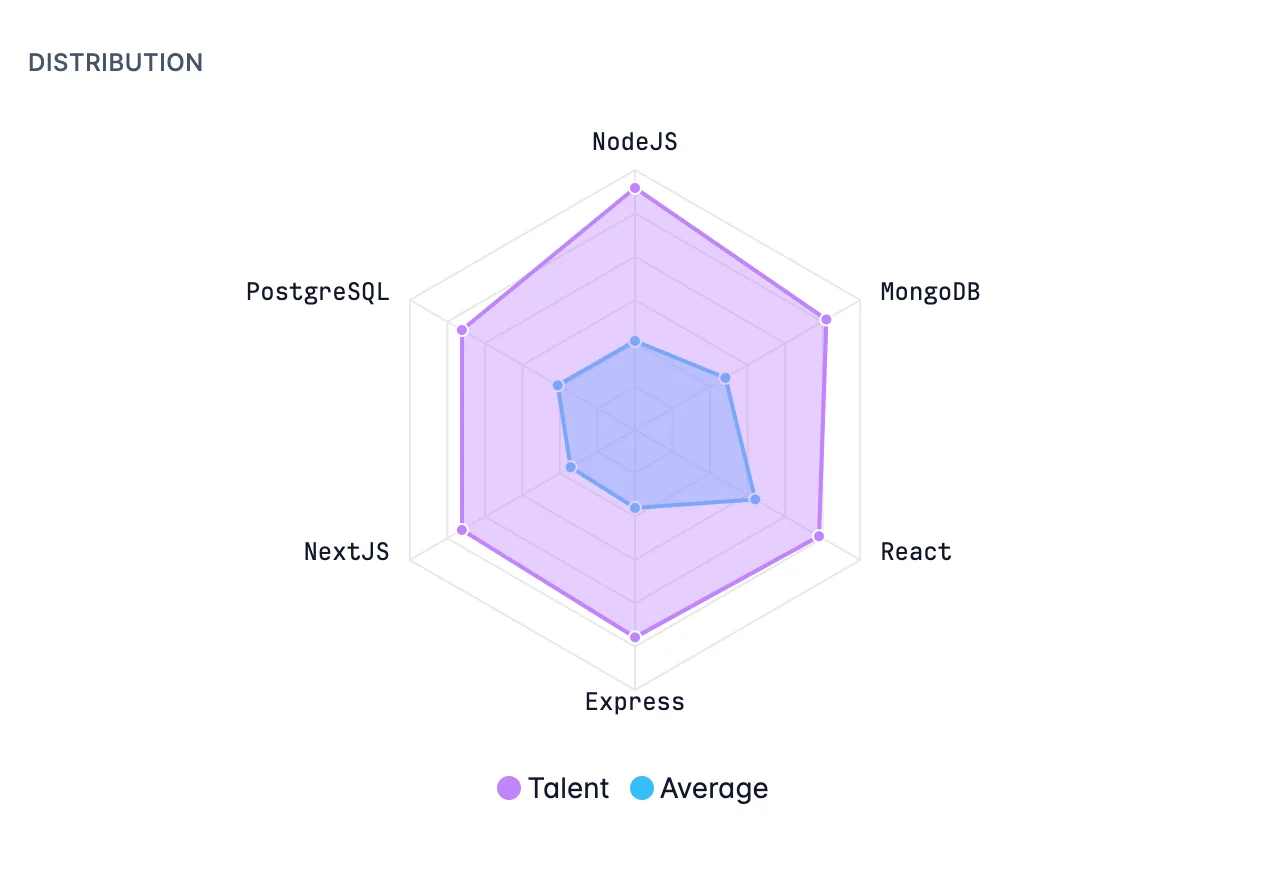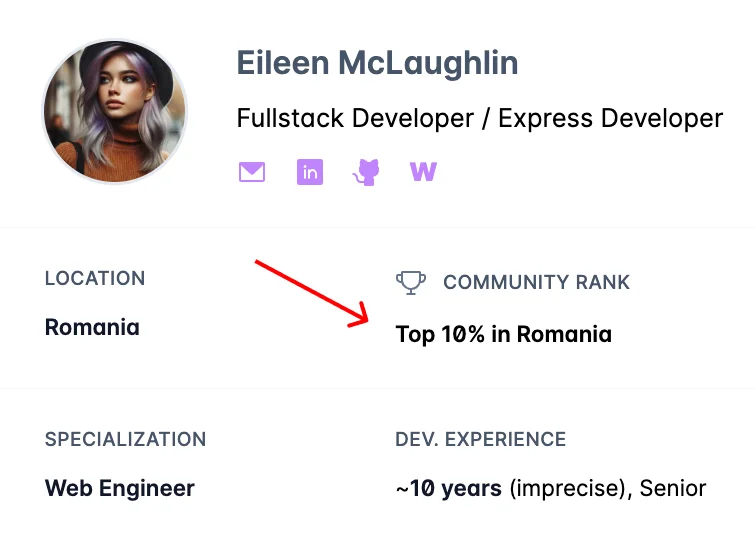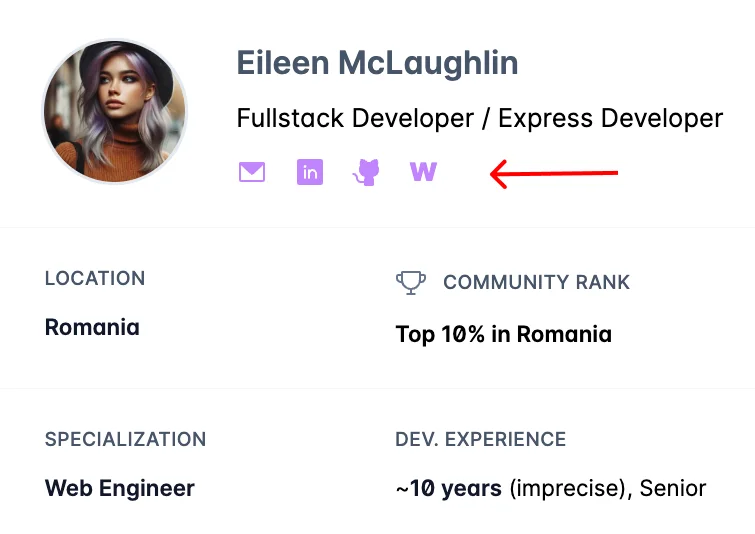How to source developers on DevScanr


This is a practical tutorial, inspired by a video lesson from Michal Juhas who searched for a “Backend JavaScript Developer” position in Romania. Michal used LinkedIn and we are going to use DevScanr to search for the same position. At the end we’ll compare our approaches and results.
- Position: Backend JavaScript Developer.
- Location: Romania.
- Experience: 4-5 years.
- Must-have skills: JavaScript (≥ 3 years), NodeJS, Basic AWS.
- Nice-to-have skills: Express, Elastic, MongoDB, TDD using Jest.
In case you are not familiar with DevScanr – it’s a tech talent search & analytics platform featuring Skills-first methodology. You can use it to:
- Find engineers in professional communities like GitHub or StackOverflow.
- Evaluate profiles by coding activity and social metrics.
- Engage prospects.
Without further ado, let’s get started!
Specialization
Firstly, it would be good to understand how many “Web Engineers” are there currently in Romania.
For recruiters familiar with LinkedIn or its local resume-based alternatives it might be tempting to start from boolean queries. The idea is to filter the initial pool by job titles to estimate the amount of profiles we can work with. You can try something like:
(Web OR Fullstack OR “Full Stack” OR Software)
AND (JavaScript OR TypeScript)
AND (Engineer OR Developer OR Programmer OR Inginer OR Programator)
To create such query recruiters have to
- Remember variations of the same term: Fullstack OR “Full Stack”.
- Remember related technologies: JavaScript OR TypeScript.
- Sometimes know local terms and jargon: “Inginer OR Programator” are Romanian words.
This step is unnecessary on DevScanr where instead of titles you rely onnormalized specializations. We enter our country into Location input and select the “Web Engineer” option in the Specialization combobox. In just a couple of clicks we get a list of 4,000+ specialists from Romania, ordered by specialization matches and custom profile scores.
Note: personal data is AI-generated, everything else (including numbers) is real.
Only 20% of GitHub accounts have searchable titles. However, it’s not a problem for DevScanr as it infers specializations with a custom AI for the entire talent pool. To do it, the system analyzes applied skills, interests, community rank, and other dev activities. The amount of work that is not practically possible to do manually.
Skills
Next we set the Required Skills to JavaScript and NodeJS, and the rest of the hard skills from the vacancy go to the Desirable Skills field. We get 1K results.
Depending on a job opening, you can also experiment with Required / Desirable / Undesirable Skills filters to increase or decrease the talent pool. Required skills work as a strict filter, while Desirable and Undesirable just affect the ranking in the list, i.e. the order.
Experience
Per job requirements we have to find a developer with at least 4-5 years of experience. Only 9% of GitHub accounts have mentioned seniority and that’s yet another task that DevScanr AI solves for us. It infers dev. experience that is strongly correlated with work experience, usually being a couple of years smaller than the latter. Therefore, we set a filter at 6+ years and we get 792 results.
Per job requirements, candidates must have worked with JavaScript for at least 3 years. How to confirm this? On resume sites, recruiters would lurk over the work history and self-proclaimed applied skills, if such information is present. We explored potential pitfalls of this approach in details in another blog post.
With DevScanr analytics section we can quickly find out (confirmed!) experience with a specific technology or a programming language. The screenshot below features a skill heatmap. It shows that talent has been working withJS, NodeJs and MongoDB since 2020, and with Express from 2021. Great match for our job!
We also can see how this talent is compared to the average web engineer from Romania by his top tech skills:

And where the engineer stands in the dev. community:

When looking for real tech stars you can tune the slider to select TOP 25% talent or higher. This rank represents an objective community rank of a person. It’s derived from a social graph of GitHub followers and is calculated with an algorithm similar to the famous Page Rank (Google).
Now, as we become more confident about the matching skills, and it took us no more than 15 sec (per profile) to evaluate, we can review career paths. To find resumes quickly, we recommend to check contacts information available on each card:

If you have too many results, as we have in our example, – filter by contacts. For instance, ask for one of LinkedIn, GitHub + Readme, GitHub.io or a Custom Site to be present in a talent card.
As you screen, save the best matching prospects to the project “Starred” list. You can export or share them with your client (or your team) later. We won’t cover this and the following steps here.
It’s certainly non-trivial to compare Skills-first and Resume-based approaches on an apples-to-apples basis. Nevertheless, let’s at least try to do that:
1. Michal in his lesson was getting between 50 and 350 results on LI, depending on different filter sets he applied. On DevScanr we have found about 500 at the same stage. DevScanr does not currently support all countries, but the underline is that its talent pool is large enough.
2. Skills-first sourcing and screening are as fast as Resume-based. You just use different data to make similar conclusions. On DevScanr you have two sources of truth: Dev. Profile and Resume(s). It works the best when you first set up filters to get hundreds of talent by job criteria, then screen the cards by available data, starring the most fitting. At this point you typically have 30–90 matching and skill-proven prospects. Finally, you check their resumes or google more data manually, and narrow it down even further – down to 10–30 qualified ones.
3. Matching resume + matching dev. profile provide more confidence than resume alone and guarantee better job interview conversions. You also have more data to engage the cold contact, namely talent interests and (soon) the connection points.
4. DevScanr uses a different talent pool and is the most affordable among the alternatives. Never tried skills-first search previously? It might be a good moment to start – just request a free trial at DevScanr.com 🚀